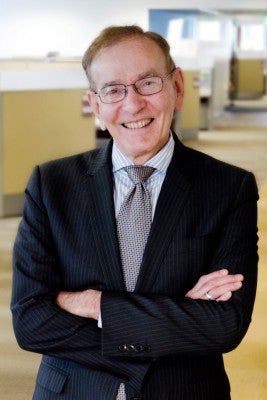Working at USC brings together professor’s ‘strands of life’
Experience in varied branches of social work gives Trojan the chance to help military veterans and launch a doctorate program.
A little more than a decade ago, Marv Southard faced a crisis that shaped his approach to leading the largest public mental health treatment system in the country.
In 2003, budget projections left the Los Angeles County Department of Mental Health approximately $21 million in the red. Would the burden of those cutbacks fall on staff members who worked directly for the county or contracted community agencies that provided equally valuable services?
“In the past, there was always a fight about what was going to be cut,” said Southard, a professor of practice at the USC School of Social Work who led the department as director from 1998 to late 2015.
To avoid an ugly battle, he worked with consultant John Ott to gather agency leaders, staff members, and clients and their family members to hash out a deal. Nothing would move forward until a unanimous agreement had been reached.
“It was an excruciating process, but we succeeded in getting through it,” he said.

When the books eventually closed months later, it turned out the department didn’t have a deficit. But the approach established a structure for community planning that helped Southard tackle some of the largest mental health issues in the county, including embracing the integration of mental health and substance abuse treatment and enhancing mental health services for children.
He hopes to continue that work.
“Working here at USC gives me an opportunity to feel like I can make a contribution to every piece of what I have been passionate about for my entire career,” he said. “It brings together so many different strands of my life experience.”
Born to serve
His religious upbringing led Southard toward the Catholic priesthood, a path he first considered taking in seventh grade during the Cuban missile crisis, a particularly terrifying period given his proximity to a strategic military base.
“As I was focusing on what I was going to do with my life, I thought I may as well focus on doing as much good as I can because it’s not going to last long,” he said.
Southard completed 10 years of training, eventually relocating to California to attend St. John’s Seminary in Camarillo. But as he approached his ordination, he felt he wasn’t quite ready to become a priest.
A new path
Instead, he took a leave of absence to pursue his master of social work degree at the University of California, Berkeley, where he studied community organizing and social planning. The university operated on a block placement system, so after a year of courses he began searching for a paid internship.
At the end of his placement, a colleague encouraged him to apply for a job in the area with Catholic Social Services, which was launching a mobile substance abuse treatment program to serve five towns in the San Joaquin Valley.
Southard figured the experience of interviewing for a position would be valuable and was surprised when he received the job. He had little knowledge of substance abuse treatment and had to learn from the staff members he supervised.
“It set up a really good template for my future management in terms of being someone who was willing to listen and build teamwork,” he said.
Holistic treatment
Although the team focused on substance abuse and diversion work, people came with a wide variety of issues, including mental health and domestic violence problems. It proved instructive, Southard said, to realize that people did not come for help in discrete categories but rather as complex individuals.
If you are going to really make a difference, you have to deal with everything a person is facing …
Marv Southard
“If you are going to really make a difference, you have to deal with everything a person is facing and not just the thing you happen to be funded to do,” he said.
After several years managing the mobile program, he decided to further his knowledge, this time earning a doctorate in social work at UCLA. While looking for a summer job, Southard reached out to a high school friend working for El Centro Human Services in East Los Angeles and landed a gig as a forensic specialist.
The assignment became permanent after Southard finished his degree, and he spent the better half of a decade at the organization as vice president of mental health programs and director of clinical services.
“It was one of the main formative experiences for me as an administrator,” he said.
Building a community
In the immediate future, he will be leading the creation of a clinic for military veterans at USC and preparing to launch a doctorate of social work program via the school’s virtual education platform later this year.
Southard’s longer-term plans also include potential research evaluations of health neighborhoods and Medicaid substance abuse benefits, which are being revamped in California. He is also interested in exploring the integration of faith and spirituality into mental health treatment, noting that Los Angeles was the first to develop clinical parameters for such work.
“I hope I can add value from some of the policy and practice experiences I’ve had to move some of these initiatives forward with students and the brain trust that is this school,” he said.
